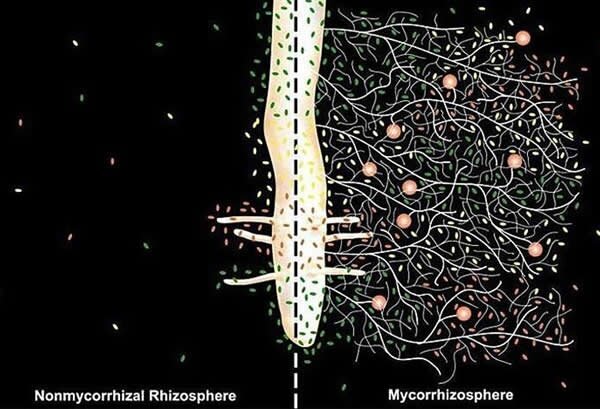How we farm
Life on earth is sustained by a complex underground ecological system
- The Soil Food Web, Dr. Elaine Ingham
In order to take care of our food, we must take care of our soil. Because of this, Rosy Farms takes soil health very seriously. We farm using the latest organic and regenerative farming practices to ensure the quality of each haskap. We treat the soil like a complex organism and not as "fertilizer in, food out”; chemically farmed dirt.
Have you ever looked at a handful of living soil? Seeing the beautiful balance between decomposition and life? Your palm will contain more organisms than the number of human beings who have ever lived: 1 trillion bacteria, 10,000 protozoa, 10,000 nematodes and 25 km of fungi, according to Young and Crawford in Science Magazine.
Regenerative Farming Practices and Products
Integrated Pest Management (IPM) - Used for insect, disease, and weed identification. This proactive approach will decrease man hours and the control measure needed, if a growing problem hatched or sprouts.
Flowering Shelter Belts - Not only do the belts increase snow catch and create a micro-climate on the land, they will also provide habitat for wild animals and beneficial insects, like native bumble bees.
Composted Manure - Two-year-old composted manure was applied at 5 tons per acre. The composted manure increases soil biology and some soil nutrients.
Annual/ Perennial Cover Crop - Spring 2015, a mix was planted on the 76 acres, inoculated with Autumn Gold, the lands first dose of mycorrhizal fungi.
Annuals
Alfalfa - for it’s deep taproot and flowers.
Daikon Radish - it’s taproot can grow down 20’, pulling up deeply stored fertility to the soil surface, known as a nutrients scavenger. Once the radish is killed by winter, its decomposition aids in the life of micro-organisms and earth worms. Flowers attract native pollinators.
Perennials
Fescues - Sheep, chewing, hard- bunch grasses are the foundation cover of most orchards. The roots greatly aid in the formation of soil colloids and aggregation because they exude a sticky substance into the soil; their tight thatch out-competes weeds.
Alsike Clover - long taproot, erosion abatement, low growing, high flowering, loves wet conditions, perfect for the south end of Rosy Farms.
Red Clover - fast to germinate, produces a floribunda of flowers in early summer to fall, perfect for native bees.
White Swedish Clover - highly competitive, choking out unwanted weeds and flowers all summer long. Another common plant in orchards.
Black plastic mulch - Serves to help weed suppression, increase soil temperatures which is great for root growth, and hold in moisture - perfect for water conservation. When taken care of, it will last for 7 to 10 years. Deer fence will be going up around the property to protect the mulch.
Compost tea - By steeping high quality compost in hyper-oxygenated water, living water is created with a mixture of nutrients and oxygen-loving (aerobic) bacteria, fungi, nematodes and other microbes. The super charged, living water is applied to the leaves of the haskaps to reduce plant stresses, because the beneficial organisms create a healthy ecosystem for the plants to grow in.
Trickle Irrigation System - 98% water efficiency because it directs water to the soil. Fertigation will allow for organic fertilizers and biology products to be directly applied to the root system.
Products
Eco Health - "Beneblend" and "Keyl8" concentrated compost tea. Together they are a highly concentrated mix of dormant, fungi, bacteria, protozoa and nematodes.
Mycorrhizae - Soluble Maxx, will be fertigated when planted - 9 endo/10 ecto mycorrhizal fungi species, 2 trichoderma species, and 12 bacterial species, and micro nutrients.
Eco Health - Organic fertilizer naturally promotes microbial growth and most importantly, the plant, for stronger growth and higher fruit yields.
Our philosophy is to connect you with our haskaps, like we reconnect our farm with nature.
We work as one to produce the highest quality fruit possible, making Rosy Farms a unique operation and a first for haskaps.




